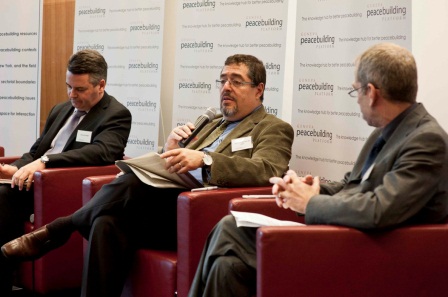Empowering local peacebuilders

Peacebuilding operations in conflict and post-conflict regions often undermine local societies. How to enable local actors to take the lead in planning and implementing programmes is rarely explained. Building capacity and allowing for local ownership, thus ensuring sustainability, are all benefits presented in the case studies the United States Institute of Peace has shared in their recent publication series Building Peace: Practical Innovations from USIP.
Bernardo Arévalo de León, Deputy Director-General, Research and Development of Interpeace, joins a selection of authors whose organizations have taken techniques traditionally used for peace time development to work in societies emerging from conflict in order to empower local peacebuilders.
“It is the use of research-based dialogue called ‘Participatory Action Research’ that contributes to defining Interpeace and works as a foundation for empowering local peacebuilders,” explains Bernardo.
Empowering local communities to engage in change and transformation
Bernardo joined the organization now called Interpeace back in 1996 to implement a series of projects in his native Guatemala drawing on this methodology. ”What impressed me was that this approach to research was designed to make local stakeholders active participants instead of passive targets. As a Guatemalan working to transform my own society, this was clearly a refreshing approach to peacebuilding and one I was naturally drawn to,” shares Bernardo. “It uses research activities to empower local stakeholders – at the different levels of society, from grassroots communities to social and political elites – to collectively and consensually engage in change and transformation. The research undertaken and the findings produced are collectively owned by the participants, not by the researcher, who eventually becomes an executing agent of the collective will of the group.”
The uniqueness of Interpeace’s approach
As Bernardo managed the implementation of a programme on security sector reform in Guatemala he quickly saw that the success of the work was due to this approach. In turn, it also enabled a number of other factors to come into play: “The ‘academic nature’ of the work meant it could have a low public profile and focus on mid- to long-term policies. This then created a framework in which participants were able to engage in rational analysis of the issues and not focus on political and ideological positions.” Bernardo elaborates: “Politically sensitive issues were tackled and concrete recommendations were made. But this was only possible because the initiative was seen to be neutral towards the different interests. Participation of individuals representing different levels and areas of Guatemalan society was also carefully balanced along with a process of incremental consensus building.”
Influencing policy development
“With a clear goal of influencing policy, the direct involvement of government officials in the process, at the working group and plenary level, facilitated the channeling of the recommendations into the public policy formulation processes. But it was the development of shared interests and the hands-on experience of collaborative action that constituted a confidence building process. This allowed incremental progress, the development of new alignments and alliances, and the formulation of a new consensus that was a key outcome,” adds Bernardo.
The role of the international community
“What was also a success from my perspective was the unobtrusive role adopted by the international actors supporting the work. They provided methodological, financial, and political support to this locally driven initiative. It allowed a real sense of ownership to emerge among participants and embedded the final recommendations to tackle the security sector issues with the society as a whole,” concludes Bernardo
This approach, successfully being used in Guatemala since 1996, is currently being implemented across Interpeace programmes around the world.
Click here for the full report.
A recent interview with Bernardo is also available here.
